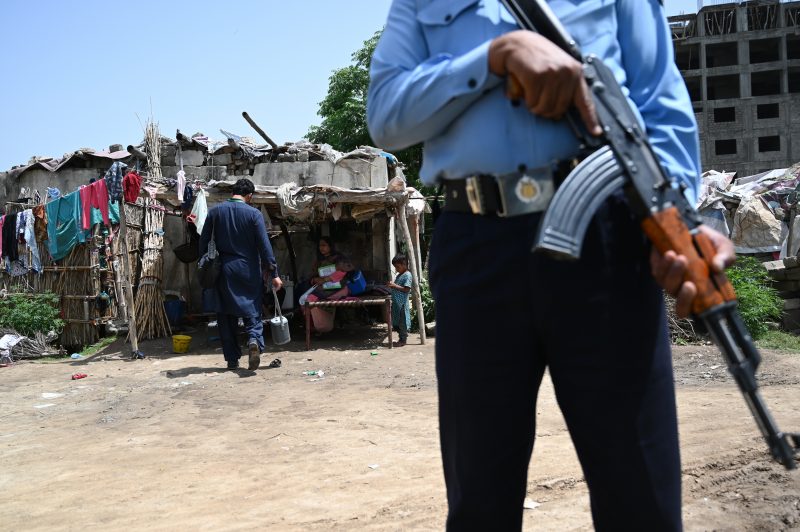Pakistani vaccine teams confront violence, hysteria in polio battle
Flanked by armed guards, polio workers have pressed on with their vaccine campaign despite ongoing violence (AAMIR QURESHI)
Islamabad (AFP) – Flanked by armed guards, polio workers fanned out in the slums of Pakistan’s capital Islamabad after a bloody week of fatal attacks on health workers threatened to derail an ongoing vaccination drive.
April has been a violent month for Pakistan’s polio campaign, with at least three people killed this week, while thousands of parents have refused to allow their children to be inoculated amid a deluge of anti-vaccine content on social media.
The violence coincided with an outbreak of hysteria in cities across northwest Pakistan after rumours of children suffering from adverse reactions to a polio vaccine sparked panic, with tens of thousands rushed to hospitals.
An official report later said a “pre-planned conspiracy” was responsible for the panic but provided few details.
The incident fed festering suspicions about the vaccine campaign, with authorities saying dozens of polio workers have been beaten, stoned, and harassed and one health clinic burned to the ground in the episode’s wake.
Undeterred health workers have continued to inoculate thousands of children — with or without security — while public health officials have argued with reluctant parents, pleading with them to vaccinate their children.
More than 250,000 health workers are involved in the campaign.
In a slum on the outskirts of Islamabad, parents cradled wailing youngsters as staff administered oral doses of the vaccine, while neighbours crowded around to watch as police scanned the surroundings.
Across the capital in an upscale apartment block, a Pakistani health worker spent time convincing mothers and fathers who had earlier refused to allow their children to be vaccinated.
“What is pinching us is actually the fake or negative social media propaganda,” Dr Mohammad Asif Rahim, an assistant deputy commissioner in Islamabad, told AFP, saying thousands of parents each day are now refusing to participate in the polio campaign.
– Anti-vax phenomenon –
Polio is endemic in only three countries globally — Pakistan, Afghanistan and Nigeria — although a relatively rare strain was also detected in Papua New Guinea last year.
Polio vaccination campaigns have faced stubborn resistance for years in Pakistan.
Opposition to myriad forms of inoculation skyrocketed after the CIA organised a fake vaccination drive to help track down Al-Qaeda leader Osama Bin Laden in the garrison town of Abbottabad, where US forces later killed the militant leader in 2011.
Some Taliban and hardline religious figures have been known to fan rumours that vaccines contain ingredients forbidden in Islam, such as pork derivatives, or that can cause infertility as part of a conspiracy to reduce the population.
Attacks by militants have also been frequent, with nearly 100 people killed in assaults targeting vaccine teams since 2012.
Despite the opposition, campaigners have reported progress with tens of millions of children vaccinated across the country along with a 96 percent drop in reported polio cases since 2014.
But as Pakistan nears its goal of ridding polio from its territory, new headwinds have arisen amid a growing global movement against inoculation.
The anti-vax phenomenon has attracted adherents worldwide, fuelled by medically baseless claims and proliferated by social media resulting in a resurgence of once-eradicated, highly-contagious diseases.
In recent months Pakistani social media has also been inundated with fake news reports and videos — garnering hundreds of thousands of views and shares in the last week alone — claiming numerous children have been killed by the polio vaccine.
Public health experts say the misinformation has inflamed already existing distrust of vaccine campaigns, resulting in a three-fold jump in refusals by parents to vaccinate their children in the last two years.
“Here people have little knowledge, so if they see a professor allegedly from the US or elsewhere who is against the vaccine, they are easily convinced,” said Rana Safdar from Pakistan’s National Institute of Health.
“Now there is a pushback. We need to regain the momentum.”
md-jf-ds-sjd/ecl
Disclaimer: Validity of the above story is for 7 Days from original date of publishing. Source: AFP.


